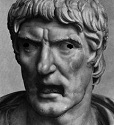|
FreudianSlippers posted:Wait, wasn't Gaulish a Celtic language, meaning that it was about as closely related to Latin as German is to Hindi/Urdu? Not really, they share every major isogloss, while Germanic-Indic share none.
|
|
|
|

|
| # ? May 11, 2024 12:11 |
|
glynnenstein posted:For a very accessible experience, The History of English podcast is very good. Episode 40 discusses the first batch of words that entered english from latin prior to the Norman invasion and it's really a very small list and a lot are associated with the church. The later Norman infusion is much larger and broader. It's interesting to see how words differ in pronunciation and meaning when they entered from the same root, but first from latin and later from french. Seconded. This podcast is really good. Second favorite history podcast after Mike Duncan's stuff. It's how I learned that "lord" originally meant "guardian of the bread".
|
|
|
|
Strategic Tea posted:Ultimately the whole west was a sideshow in a lot of respects. The east had the real population centres and cultural powerhouses, based in cities that were old and powerful when Rome was still a hill fort. While it's true that the east had the majority of the population and major cultural centers, I don't think it's true that the west was a sideshow. The mere fact that the empire was eventually divided in half implies that the Romans themselves thought of the East and West as being in some way equivalent. It contained Rome itself, after all, and also economically important regions like the African farmlands, Iberian and Britannic mines, and Italian and Gallic wine country.
|
|
|
|
skasion posted:While it's true that the east had the majority of the population and major cultural centers, I don't think it's true that the west was a sideshow. The mere fact that the empire was eventually divided in half implies that the Romans themselves thought of the East and West as being in some way equivalent. It contained Rome itself, after all, and also economically important regions like the African farmlands, Iberian and Britannic mines, and Italian and Gallic wine country. Wasn't the senior emperor in the East, though? There were two halves but the east was more important.
|
|
|
|
Blue Star posted:Wasn't the senior emperor in the East, though? There were two halves but the east was more important.
|
|
|
|
Blue Star posted:Wasn't the senior emperor in the East, though? There were two halves but the east was more important. Sometimes, but not always. Valentinian and his family usually had the senior in the west and the junior in the east. "Senior" and "junior" emperors aren't really a very meaningful concept after Theodosius anyway, it's really just under the tetrarchy that the concept was binding and from Constantine to Theodosius it lost force more or less entirely.
|
|
|
|
If the East had all the big cities, then why do some people reference "the manpower of the West"? Perhaps a better question: why in the late Republic do the Western province-holders almost always defeat the Eastern province-holders?
|
|
|
|
Ynglaur posted:If the East had all the big cities, then why do some people reference "the manpower of the West"? Perhaps a better question: why in the late Republic do the Western province-holders almost always defeat the Eastern province-holders? Late Republic would still have had a lot of Romans and Italians in the legions, right? I bet that would make a big difference.
|
|
|
|
Ynglaur posted:If the East had all the big cities, then why do some people reference "the manpower of the West"? Perhaps a better question: why in the late Republic do the Western province-holders almost always defeat the Eastern province-holders? Who's referencing the manpower of the west? Arguments about the relative manpowers of the various provinces of the late empire seem really unlikely to be well founded to me, given that we have no reliable sources whatsoever which even tell us how big the whole Roman army was at that time. The closest we have is the Notitia Dignitatum but that's full of all kinds of problems and can't possibly be used to justify claims about how many men were fighting for whoever -- at best it can tell us how many military units in theory existed. The second is a better question but not really related, there's a gigantic difference between the Roman Empire of the civil wars and the Roman Empire of the dominate. The victors in the republican civil wars were those who took and held control of Rome, because that was the source of legitimacy for their government and the basis for the Italian hegemony which supplied most of their manpower. It's not until a much later date that political and military power become decentralized and Rome itself loses its relevance as a source of power.
|
|
|
|
Strategic Tea posted:Ultimately the whole west was a sideshow in a lot of respects. The east had the real population centres and cultural powerhouses, based in cities that were old and powerful when Rome was still a hill fort. This isn't really true until about Constantine's time unless your definition of "the East" is really just "Egypt."
|
|
|
|
Constantine managed to win his civil war from the western empire. If the west was a complete backwater then surely the eastern Augustus could have mustered enough men and money to win. Theodosius was the eastern Augustus and he won, but he also had a bunch of Goths on his side. It seems like the two halves were fairly evenly matched from a military perspective.
|
|
|
|
You're right side sideshow was way too strong a word for what I wanted to say
|
|
|
|
Blue Star posted:Wasn't the senior emperor in the East, though? There were two halves but the east was more important. The senior Emperor was definitely in the East, and this was for good reason. I think the characterization of the West as a "sideshow" is absolutely correct, if the West is considered to be Gaul, the Iberian provinces, Germania, and Britain. Italy muddies things up a bit. The East was where the people and the money were from Augustus onward. It's also where Roman religion and culture increasingly came from throughout the imperial period. Rome's greatest enemies, the Parthians and Sassanids, threatened the East. The East was where stuff happened.
|
|
|
|
Things happened to the West, things happened in the East. There are definitely exceptions to this sweeping generalization that I'm covering several hundred years with, but I believe it's the overall trend.
|
|
|
|
Bitter Mushroom posted:Crassus really strikes me as the Donald Trump of his day.
|
|
|
|
John Big Booty posted:Nonsense. Crassus was only morally bankrupt. 
|
|
|
|
What are some good podcasts or audio books about Hellenistic Greece or ancient history in general? I'm about to finish The History of Rome and looking for something else to listen to during my morning commute.
|
|
|
|
LLSix posted:What are some good podcasts or audio books about Hellenistic Greece or ancient history in general? I'm about to finish The History of Rome and looking for something else to listen to during my morning commute. I fell really far behind on it myself after he took a long break, but the History of Byzantium follows up directly after where the History of Rome finished if that fits within the timeframe you're looking for.
|
|
|
|
One of the more interesting assassinations of Roman Emperors was that of Leo V the Armenian Wikipedia posted:When Leo jailed Michael for suspicion of conspiracy, the latter organized the assassination of the Emperor in the palace chapel of St. Stephen on Christmas, 820. Leo was attending the matins service when a group of assassins disguised as monks suddenly threw off their robes and drew their weapons. In the dim light they mistook the officiating priest for the Emperor and the confusion allowed Leo to snatch a heavy cross from the altar and defend himself. He called for his guards, but the conspirators had barred the doors and within a few moments a sword stroke had severed his arm, and he fell before the communion-table, where his body was hewed in pieces.
|
|
|
|
http://worldnewsdailyreport.com/mongolia-archaeologists-unearth-tomb-of-genghis-khan/quote:Öndörkhaan| Construction workers employed in road building near the Onon River in the Khentii province of Mongolia, have discovered a mass grave containing the remains of many dozens of human corpses lying upon a large rudimentary stone structure. Forensic experts and archaeologists were called on the site, which was revealed to be a Mongolian royal tomb from the 13th century that the scientists believe to be Genghis Khan’s. Nothing official yet, but its possible it has finally been found. It will be interesting to watch the developments on this story.
|
|
|
|
Something about the tomb of Genghis Khan, in the Antiquity thread? Uhh, ok I guess... World News Daily Report, seems legit. <Checks poster's user name> Oh.
|
|
|
|
Hitler was a woman and Judas was a marijuana addict. Checks out with me.
|
|
|
|
Let's discuss why the tomb someone found five minutes ago is always of a famous historical figure. People in history died and when they died someone would usually bury them someplace. Some of these people would be super famous and still well known names today. Archaeologists are chronically underfunded, and always looking for ways to get more money for their expeditions. Governments are bad at funding archaeology. However, people get excited about names they've heard, like Genghis Khan, and that excitement often translates into money for the archaeologists. Archaeologists are not dumb and really want that money so they can keep working. Many, even respectable, legitimate archaeologists, will therefore suggest that their newest find is connected to someone famous. They know that this will get them money, and people don't remember if they turn out to be wrong. And the expedition was funded and good work done, so no harm done. And sometimes it turns out that the discovery really is the tomb of famous guy, and now you get to be Famous Archaeologist.
|
|
|
|
Only 12 horses, can't be him.
|
|
|
|
Personally I still hold out hope that one day they'll find Howard Carter's tomb, hopefully still intact
|
|
|
|
There's an extract I'm struggling and failing to remember. I think it was Julius Caesar in a winter break while he was planning the invasion of Gaul or Britain, and he's in the countryside with someone's wife (maybe even his own!), and it's either a letter or a shared anecdote by an ancient historian basically saying that he was so happy and considering giving up the military life and just retiring to the countryside to live out a peaceful life with his family... Obviously then he leaves and goes to plan the campaign. Does anybody know what I'm talking about? It's such a vague memory I really have had no luck finding it in google, there are so many sources I could have read it in that I'm hoping one of you cottons on to what I'm referring to. I can't even be sure it's Caesar, it could be Pompey (and sounds more like his character, hubby that he was).
|
|
|
|
|
Sulla-Marius 88 posted:There's an extract I'm struggling and failing to remember. I think it was Julius Caesar in a winter break while he was planning the invasion of Gaul or Britain, and he's in the countryside with someone's wife (maybe even his own!), and it's either a letter or a shared anecdote by an ancient historian basically saying that he was so happy and considering giving up the military life and just retiring to the countryside to live out a peaceful life with his family... Obviously then he leaves and goes to plan the campaign. Does anybody know what I'm talking about? It's such a vague memory I really have had no luck finding it in google, there are so many sources I could have read it in that I'm hoping one of you cottons on to what I'm referring to. I can't even be sure it's Caesar, it could be Pompey (and sounds more like his character, hubby that he was). Sounds like one of the plot points from Rome, season 1. Don't know where they pulled it from, though.
|
|
|
|
I doubt it's what you're thinking of but I do wonder if she based it on the same extract - there is a section in one of Colleen McCullough's books where she writes about Caesar having taken a Gaulish wife and even having a son with him, and his time with them being one of the few moments of relaxation/peace/happiness he has between his efforts to subdue Gaul and his long term plans for complete power in Rome. Of course that section ends with the wife being killed and the son kidnapped in the aftermath of Alesia by one of the surviving Gaulish ringleaders as a final "gently caress you" to Caesar, because McCullough was writing historical fiction so she went crazy with the speculation when she could get away with it.... which made for ripping good yarns!
|
|
|
|
Caesar: every woman's husband, and every man's wife.
|
|
|
|
Ynglaur posted:Caesar: every woman's husband, and every man's wife. Caesar: How amusing that song is, my fellow 
|
|
|
|
Sulla-Marius 88 posted:There's an extract I'm struggling and failing to remember. I think it was Julius Caesar in a winter break while he was planning the invasion of Gaul or Britain, and he's in the countryside with someone's wife (maybe even his own!), and it's either a letter or a shared anecdote by an ancient historian basically saying that he was so happy and considering giving up the military life and just retiring to the countryside to live out a peaceful life with his family... Obviously then he leaves and goes to plan the campaign. Does anybody know what I'm talking about? It's such a vague memory I really have had no luck finding it in google, there are so many sources I could have read it in that I'm hoping one of you cottons on to what I'm referring to. I can't even be sure it's Caesar, it could be Pompey (and sounds more like his character, hubby that he was).
|
|
|
|
Damnit, I was worried I had invented it or confused it with a non historic source. It has been years since I've read any primary/secondary source Rome stuff, and longer still since I've watched the tv show, so I can't say for sure. I was hoping someone would be able to pop up and say "oh yeah that's Livy book blah blah" but it's so tenuous I'll just purge it from my memory banks as bad data. Thanks anyway!
|
|
|
|
|
Sulla-Marius 88 posted:There's an extract I'm struggling and failing to remember. I think it was Julius Caesar in a winter break while he was planning the invasion of Gaul or Britain, and he's in the countryside with someone's wife (maybe even his own!), and it's either a letter or a shared anecdote by an ancient historian basically saying that he was so happy and considering giving up the military life and just retiring to the countryside to live out a peaceful life with his family... Obviously then he leaves and goes to plan the campaign. Does anybody know what I'm talking about? It's such a vague memory I really have had no luck finding it in google, there are so many sources I could have read it in that I'm hoping one of you cottons on to what I'm referring to. I can't even be sure it's Caesar, it could be Pompey (and sounds more like his character, hubby that he was). This sounds like Caesar retiring to his estate with Cleopatra in the Asterix books.
|
|
|
|
In cool and good news: the Vatican digitised a 1600 year old edition of Virgil’s Aeneid. , which can be seen here.
|
|
|
|
Charlie Mopps posted:In cool and good news: the Vatican digitised a 1600 year old edition of Virgil’s Aeneid. , which can be seen here. Three things: 1. This is loving awesome. 2. WHEN did people realize punctuation and spaces between words was a good thing? 3. This is loving awesome.
|
|
|
|
Jerusalem posted:
Medieval Times. For a while, the Greeks actually were so concerned with keeping the strings of sounds together that they wrote without punctuation or spaces and also boustrephedon (lines in alternating directions):  It didn't take root in Latin, though (whew).
|
|
|
|
Sulla-Marius 88 posted:There's an extract I'm struggling and failing to remember. I think it was Julius Caesar in a winter break while he was planning the invasion of Gaul or Britain, and he's in the countryside with someone's wife (maybe even his own!), and it's either a letter or a shared anecdote by an ancient historian basically saying that he was so happy and considering giving up the military life and just retiring to the countryside to live out a peaceful life with his family... Obviously then he leaves and goes to plan the campaign. Does anybody know what I'm talking about? It's such a vague memory I really have had no luck finding it in google, there are so many sources I could have read it in that I'm hoping one of you cottons on to what I'm referring to. I can't even be sure it's Caesar, it could be Pompey (and sounds more like his character, hubby that he was). Gladiator?
|
|
|
|
Sulla-Marius 88 posted:Damnit, I was worried I had invented it or confused it with a non historic source. It has been years since I've read any primary/secondary source Rome stuff, and longer still since I've watched the tv show, so I can't say for sure.
|
|
|
|
While I'm not going to argue for the strict historical accuracy of an HBO show, Rome does tell a story about a series of events that actually happened, putting them in more or less the right order and context and involving most of the people who were actually involved in them. It's about as grounded in history as the Liz Taylor Cleopatra, rather than being whole cloth fiction like Gladiator.
|
|
|
|

|
| # ? May 11, 2024 12:11 |
|
Rome was historically plausible even if it wasn't accurate.
|
|
|























 Yes, it's like a lava lamp.
Yes, it's like a lava lamp.














